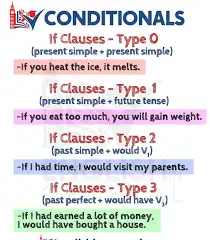- Conditional sentences are complex sentences with two parts: a condition (starting with if or unless) and a result, used to express possibilities or hypothetical situations. There are four types of conditional sentences.
- The zero conditional is used for universal truths or general facts. Example: If water reaches 100°C, it boils.
- The first conditional is used for real and possible future events. Example: If you exercise regularly, you will feel healthier.
- The second conditional is used for unlikely or hypothetical scenarios. Example: If I won a million dollars, I would travel the world.
- The third conditional is used for unreal or hypothetical situations in the past. Example: If they had prepared better, they would have won the match.
Have you ever stumbled upon a sentence that starts with if or unless? If so, you’ve encountered a conditional sentence. Conditional sentences are everywhere—in books, speeches, and daily conversations. They help us express possibilities, hypothetical situations, and consequences.
Here, we’ll explore the four types of conditional sentences and the formulas they follow, with examples.
Table of contents
What are conditional sentences?
Zero conditional sentences: facts and general truths
First conditional sentences: real possibilities
Second conditional sentences: unreal or improbable situations
Third conditional sentences: past hypotheticals
Exceptions and special cases with conditional sentences
What are conditional sentences?
Conditional sentences are a type of complex sentence. They have two parts: a condition (often introduced by if or unless) and a result.
The condition sets up a situation, and the result tells us what will happen if that situation occurs. For example, in the sentence “If it rains, we will stay indoors,” the phrase “If it rains” is the condition, and “we will stay indoors” is the result.
Understanding these sentences is key to expressing and understanding hypothetical situations in English.
There are four main types of conditional sentences, which we’ll explore below.
Zero conditional sentences: facts and general truths
The zero conditional is the simplest type of conditional sentence. It’s used to express facts and general truths.
The zero conditional formula is: If + [simple present], … [simple present].
In this sentence, the condition is “If you heat ice,” and the result is “it melts.” This is a general truth, as it’s always the case that if you heat ice, it melts.
Here are a few more examples:
Remember, the zero conditional is all about facts and general truths. It’s not about specific situations or possibilities. It’s about what’s always true.
First conditional sentences: real possibilities
The first conditional is used to talk about real and possible situations in the future.
The first conditional formula is: If + [simple present], … will + [infinitive].
In this sentence, the condition is “If it rains,” and the result is “I will stay home.” This is a real possibility: “It might rain, and if it does, I will stay home.”
Here are a few more examples:
Remember, the first conditional is all about real possibilities in the future and what might happen. It’s not about general truths or hypothetical situations.
Second conditional sentences: unreal or improbable situations
The second conditional is used to talk about unreal or improbable situations in the present or future.
The second conditional formula is: If + [simple past], … would + [infinitive].
In this sentence, the condition is “If I won the lottery,” and the result is “I would buy a house.” This is an unreal situation: “I probably won’t win the lottery, but if I did, I would buy a house.”
Here are a few more examples:
To summarize, the second conditional is all about unreal or improbable situations. It’s not about what will happen but what could happen in an alternate reality.
Third conditional sentences: past hypotheticals
The third conditional is used to talk about unreal situations in the past.
The third conditional formula is: If + [past perfect], … would have + [past participle].
In this sentence, the condition is “If I had studied harder,” and the result is “I would have passed the exam.”
This unreal situation refers to something that could have but didn’t happen: ”I didn’t study hard, and I didn’t pass the exam. But if I had studied harder (in the past), I would have passed the exam (in the past).”
Here are a few more examples:
Remember, the third conditional is all about unreal situations in the past. It’s not about what did happen but what could have happened in a different past.
Exceptions and special cases with conditional sentences
Conditional sentences aren’t always straightforward, and there are exceptions and special cases to consider. Sometimes, the standard structure of conditional sentences might not apply. This is often due to the context or the specific meaning we want to convey.
Here are some of these exceptions and special cases.
Mixed conditionals
Mixed conditionals are a blend of second and third conditionals. They’re used when the time referenced in the if clause is not the same as the time referenced in the main clause.
Inverted conditionals
Inverted conditionals have a more formal structure. They invert the subject and auxiliary verb in the if clause.
These structures are more common in written English and formal situations.
Mastering conditional sentences can significantly enhance your English skills. They add depth to your communication, whether in writing or speaking. Remember, practice is key. Try creating your sentences using the different conditionals, and don’t hesitate to experiment with exceptions and special cases.
Conditional sentences FAQs
What is a conditional sentence?
A conditional sentence is a complex sentence with a condition and a result, often starting with if or unless. Conditional sentences are essential for expressing possibilities, hypothetical scenarios, and consequences in daily conversations and writing.
How does the zero conditional work?
The zero conditional describes general truths or facts.
- Formula: If + [simple present], … [simple present].
- Example: If you freeze water, it turns to ice.
What is the purpose of the first conditional?
The first conditional describes real and possible future events.
- Formula: If + [simple present], … will + [infinitive].
- Example: If she studies, she will ace the test.
How do the second and third conditionals differ?
The second conditional describes unreal or unlikely situations in the present or future, whereas the third conditional describes unreal past events.
- Second conditional: If I were rich, I would travel the world.
- Third conditional: If I had studied, I would have passed the exam.
What are some exceptions in conditional sentences?
Mixed conditionals combine timeframes (Example: If I had saved money, I would be debt-free now). Inverted conditionals invert the subject and auxiliary verb in the if clause (Example: Had I known, I would have helped.).





